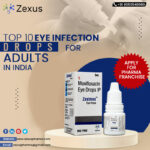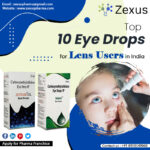WORKING DAYS
Mon-Sat: 10.00 to 7.00
Tips for Avoiding Eye Infections
Tips for Avoiding Eye Infections – Eye infections such as pink eyes, dry eyes, blepharitis, keratitis, etc. are never fun. In most cases, eye infections aren’t that dangerous, but any type of infection in the human body can create larger problems. This is especially true of your sensitive and precious eyes. So the best way to ignore the discomfort of an eye infection and any issue that stems from the condition is through vigilant prevention.

When an eye infection happens, it means that your eye has been overran by harmful fungi, unwanted bacteria, or viruses. As a result, you will have reactions and symptoms such as pain, discharge, redness, and light sensitivity. An ophthalmic is a great choice to treat the infection and help you bounce back to your normal activities again.
Tips for Avoiding Eye Infections
Here are a few tips for Avoiding Eye Infections.
1. Wash your Hands Regularly
Pink eye and dry eye is one of the most common eye infections out there and they can easily spread from one person to another person. While most prevalent in the elementary school grades, pink eye and dry eye infections can affect anyone. You only need to touch something infected with dry eye and pink eye viruses and bacteria and rub or touch your eyes.
This could happen by touching a doorknob after someone infected just touched it before you or by way of shaking hands. Frequent handwashing is the best way to prevent bacteria or viruses of pink eye and dry eye from landing on your face or in your eyes.
2. Avoid Rubbing Your Eyes
Rubbing your eyes feels fantastic, and gives another level of satisfaction but it’s not the best thing for your eyes. In this informative blog, we talk about how frequent eye rubbing can scratch your cornea or cause thinning of the corneal tissue. It also raises your risk for eye infections. First, rubbing your eyes puts your eye in direct contact with potential offenders, including viruses, allergens, bacteria, and funguses, all of which can lead to severe infection. Secondly, rubbing your eyes and failing to wash your hands makes you more likely to spread infection in your surroundings.
3. Clean your Contact Lenses
Never skip cleaning your contact lenses to avoid eye infections. Because lenses sit on your eye’s surface, they gather potential infection-causing components without the potential to clean the way the surface of the eyeball does on its own. Always clean your contact lenses as per the manufacturer’s or your eye care expert’s recommendations.
If you drop a lens, do not put it back into your eye without a clean wash. If you don’t have a designated contact lens washing solution in your bag, purse, desk, glove compartments, etc. ditch the lens and take eyeglasses instead.
4. Don’t Sleep with Contact Lenses
Sure, several lens manufacturers say you can but we don’t support it. Your eyes need a break and sleeping with contact lenses means more time for the eye to be uncovered to any potential infection ported on the lens. Plus, contact lenses can perceive the eyes and the more irritated your eyes are, the more unprotected they are to infection.
5. Replace old Contact Lenses as Directed
Do not wear your contact lenses for longer than they are meant to last. Most excessive lenses are manufactured for one-day, one-week, or 14-day periods. Even if they look fine, endure the urge to stretch your prescription by wearing them for extra days.
Soft contacts are spongy lenses, and the membranes begin to break down when worn past their calculated use date. This makes them less likely to protect your eye and more likely to allow potential pest direct contact with your eye.
6. Flush Your Eyes Thoroughly After Swimming in Rivers or Lakes
During the summer, we see a boost in eye infections especially in swimmers, caused by acanthamoeba, a water-bourne microscopic element that infects the eyes. Once again, contact lens wearers are the most sensitive, but anyone’s eyes can be affected if they swim in water with the acanthamoeba element.
While acanthamoeba bacteria are found in tap water, they are found in the highest application in streams, rivers, pools, lakes, hot tubs, and the soil. If you are a swimmer or love to spend time in the water, flush your eyes thoroughly with clean or filtered water and/or a gentle saline solution afterwards to lower your risk of infection.
7. Never Share Makeup Brushes
As mentioned in number one, pink eye, dry eyes and most other eye infections are highly infective. Sharing your makeup such as mascara, eyeliner, and eye shadow brushes is one of the most common ways to spread pink eye, and dry eye, especially in the teenage population, siblings, friends or between parents and children. Avoid sharing makeup brushes altogether to avoid severe eye infections.
8. Make Healthy Lifestyle Choices
Most eye infections clear up on their own due to your weak immune system. That said, the weaker your immune system is, the more likely you are to be ready to develop an infection or to suffer for longer than necessary time. Making healthy lifestyle choices, such as getting plenty of exercise, eating a nutritious diet, reducing your screen time, and making sure to get adequate sleep each night, goes a long way towards avoiding eye infections and lowering their symptoms and side effects if you do budge to conjunctivitis.
9. Avoiding Eye Infections when Treating Eye Injuries
Anytime your eye is punctured or scratched, it is at a higher risk of evolve an infection. This is especially the case for those injured individuals during yard work or outdoor activities where an errant branch, dust particles, foxtails, or other yard debris carry a wide range of potential irritants directly onto and into your eyes.
Make sure to treat any eye irritation or injury with great care. Flush your eyes with clean or filtered water regularly, watch for early signs or symptoms of infection, and schedule an appointment with an ophthalmic if your symptoms don’t seem better within 24 to 48 hours.
10. Minimize the Eyes’ Exposure to Mold and Other Allergens
Allergies and infections cause eye irritation and inflammation. That makes your eyes more likely to become infected. Try to reduce exposure to mold and other allergens by:
- Prioritise wearing your eyeglasses and skipping contact when working in a dusty environment or with known allergens or during the peak of allergy season.
- Wearing safety goggles when doing hard work or other work that blends up airborne allergens,
- Installing a whole-home filtration system, if possible,
- Speaking to your doctor about over-the-counter allergy eye drops to lower eye irritation or inflammation,
- Washing your hands regularly, and before touching your eyes,
Conclusion
Zexus Pharma has been providing high-quality over-the-counter eye drops at a reasonable price. All of our products are extremely safe for consumers and are highly recommended to prevent different types of eye infections





